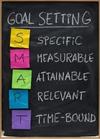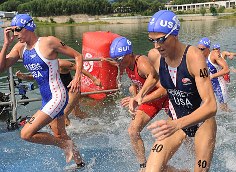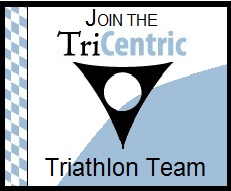How to define and establish goals
| Often goals are set with a completely arbitrary process of "wanting" without regard to how a goal is defined and established. A few examples: -I want to qualify for Kona Ironman World Championship -I want to go sub "X" hours in an Ironman -I want to do X number of races this year -I want to run (place any activity here) 20 times this month and so on... While those may be possible, I would argue that they are not goals but rather ambitions (The desire for personal achievement) since there are many factors out of your control. While these may become goals, they first must pass the test within your goal-setting practice. Goals should be a stretch but they should be in reach... they should take work and dedication to achieve. The definition of a goal is: A desired result in some sort of assumed development. Your goals may be fueled by ambition, however that ambition is not your goal... a goal is defined by the desired result. |

Goal Setting
So how do you set goals? what factors should be considered? While the ambition and drive behind goals are individual, the process for setting your athletic goals is simple and applicable to everyone. If you have a coach, it's a great practice to establish goals with your coach... and if you have a family or loved ones that may be affected by your goals I strongly recommend that they be involved as well. In setting goals, the S.M.A.R.T principal proves quite effective in athletic goals... give this a try in you next goal setting endeavor:
-Specific: Setting a specific goal is much more motivating... the goal of (for example) lowering your half Ironman time from 5:30 to a sub 5 hour finish within 9 months is very specific. If you simply say "I want to go faster"... that is far too general and will prove difficult to stay motivated.
-Measurable: A measurable goal allows progress to be tracked. By setting a specific goal (above) you can map out a plan to achieve the goal and track progress along the way. So... if you need to knock off 30 minutes you know that you need to cut 5 (swim), 10 (bike), 15 (run) {this was a past goal and formula of mine} minutes to achieve your goal. Your training can now support that goal and progress can be tracked along the way.
-Attainable: A goal should make you reach but it should be attainable otherwise it is just a dream, wish or ambition. Using the example above you can easily see that there is work to be done and sacrifices to be made but the goal is achievable. It is also a good practice to include an adjustment clause to allow for the flexibility required when life throws unexpected challenges at you. Adjustability does not change the goal, it simply is wise to be flexible within realistic perimeters to keep your goals attainable... (a few examples why you need to be flexible: could not register for goal race, Injury, work constraints, family priorities)
-Relevant: This means that your goals must be realistic. If you have never done a triathlon than a sub 5 half Ironman goal may not be relevant yet. If you have never gone sub 6 and your fitness, training performance and history with athletic goals don't support sub 5 potential than you should consider a more appropriate goal. On the other end of the spectrum... if your goals are too simple and easy there is not much feeling of achievement. Only you and perhaps your goal team know what is a relevant goal for you.
-Time-Bound: Sub 5 hour half Ironman within 9 months is specific and time based. It also allows you to focus on shorter term goals within that time period to help you stay on track with your long term goal. This will help you stay motivated, avoid procrastination and ensure that your goals are within reach with the proper dedication while avoiding burnout.
By following the steps in the S.M.A.R.T. principal you can now put a plan in action to achieving your goal. If your goals do not stand up to any of these principals than make the adjustments so they do... this will allow your ambition to come to life in the pursuit of you goal
Forward progress!
~B
So how do you set goals? what factors should be considered? While the ambition and drive behind goals are individual, the process for setting your athletic goals is simple and applicable to everyone. If you have a coach, it's a great practice to establish goals with your coach... and if you have a family or loved ones that may be affected by your goals I strongly recommend that they be involved as well. In setting goals, the S.M.A.R.T principal proves quite effective in athletic goals... give this a try in you next goal setting endeavor:
-Specific: Setting a specific goal is much more motivating... the goal of (for example) lowering your half Ironman time from 5:30 to a sub 5 hour finish within 9 months is very specific. If you simply say "I want to go faster"... that is far too general and will prove difficult to stay motivated.
-Measurable: A measurable goal allows progress to be tracked. By setting a specific goal (above) you can map out a plan to achieve the goal and track progress along the way. So... if you need to knock off 30 minutes you know that you need to cut 5 (swim), 10 (bike), 15 (run) {this was a past goal and formula of mine} minutes to achieve your goal. Your training can now support that goal and progress can be tracked along the way.
-Attainable: A goal should make you reach but it should be attainable otherwise it is just a dream, wish or ambition. Using the example above you can easily see that there is work to be done and sacrifices to be made but the goal is achievable. It is also a good practice to include an adjustment clause to allow for the flexibility required when life throws unexpected challenges at you. Adjustability does not change the goal, it simply is wise to be flexible within realistic perimeters to keep your goals attainable... (a few examples why you need to be flexible: could not register for goal race, Injury, work constraints, family priorities)
-Relevant: This means that your goals must be realistic. If you have never done a triathlon than a sub 5 half Ironman goal may not be relevant yet. If you have never gone sub 6 and your fitness, training performance and history with athletic goals don't support sub 5 potential than you should consider a more appropriate goal. On the other end of the spectrum... if your goals are too simple and easy there is not much feeling of achievement. Only you and perhaps your goal team know what is a relevant goal for you.
-Time-Bound: Sub 5 hour half Ironman within 9 months is specific and time based. It also allows you to focus on shorter term goals within that time period to help you stay on track with your long term goal. This will help you stay motivated, avoid procrastination and ensure that your goals are within reach with the proper dedication while avoiding burnout.
By following the steps in the S.M.A.R.T. principal you can now put a plan in action to achieving your goal. If your goals do not stand up to any of these principals than make the adjustments so they do... this will allow your ambition to come to life in the pursuit of you goal
Forward progress!
~B




 RSS Feed
RSS Feed





